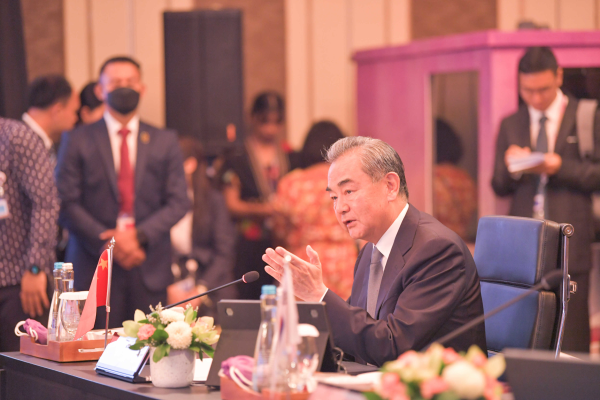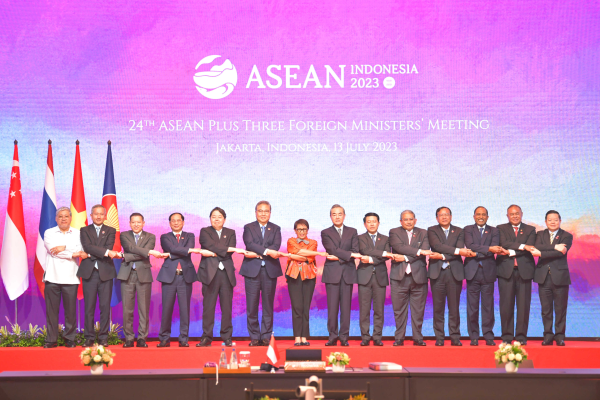
Director of the Office of the Central Commission for Foreign Affairs Wang Yi attends the ASEAN Plus Three (APT) Foreign Ministers' Meeting, Jakarta, Indonesia, July 13, 2023. /Chinese Foreign Ministry
The Association of Southeast Asian Nations (ASEAN) and China, Japan and South Korea should adhere to openness and cooperation, and accelerate the process of regional integration, senior Chinese diplomat Wang Yi said on Thursday.
When attending the ASEAN Plus Three (APT) Foreign Ministers' Meeting, the director of the Office of the Central Commission for Foreign Affairs said the APT is one of the most mature mechanisms for East Asia regional cooperation, and the countries should strengthen their cooperation and jointly meet challenges.
Wang called on the regional countries to push for economic recovery, adding China has provided support for economic and technological cooperation under the Regional Comprehensive Economic Partnership (RCEP) and helped ASEAN countries enhance their abilities to implement the RCEP free trade deal.
He urged the regional countries to promote sustainable development, saying China has provided medical supplies as well as help for emergency rice reserves and poverty alleviation cooperation.
He also appealed to resume personnel exchanges, calling for an increase in commercial flights between countries in the region and an orderly resumption of inbound tourism.
To construct an East Asian community and inject more strength into regional and world economic recovery and growth, Wang put forward three proposals for the next stage of APT cooperation.

Group photo of foreign ministers from ASEAN countries, China, Japan and South Korea at the ASEAN Plus Three (APT) Foreign Ministers' Meeting, Jakarta, Indonesia, July 13, 2023. /Chinese Foreign Ministry
First, he called to accelerate the process of regional integration. Taking the full entry into force of RCEP as an opportunity, Wang called for supporting Hong Kong's accession to RCEP as one of the first batch of members. He also said China supports the construction of a stable, smooth and comparative advantage-based regional production and supply chain system.
Second, he urged to keep improving the effectiveness of crisis response, adding China will continue to donate funds to the APT Emergency Rice Reserve mechanism, strengthen the ASEAN food security information system and better safeguard regional food security.
Wang noted that the discharge of nuclear-contaminated water from Japan into the ocean has a bearing on the safety of the marine environment and the health of human lives, so Japan should not act unilaterally.
Third, Wang advocated for innovation and fully tapping the potential of sustainable development. He said China supports ASEAN's statement on the development of the APT electric vehicle ecosystem and it will continue to promote cooperation in the areas of poverty alleviation, village official exchanges and rural development.
The foreign ministers of Japan, South Korea and ASEAN countries acknowledged that the APT mechanism has played a key role in helping regional countries to achieve speedy recovery from the COVID-19 pandemic and sustainable development, and has become a solid and reliable anchor of stability.
They support an open and inclusive ASEAN-centered regional cooperation framework, adhere to multilateralism, and maintain regional peace, stability and prosperity.
They also agreed that the APT mechanism should keep pace with the times, give full play to the role of the APT Emergency Rice Reserve mechanism, actively push forward the Chiang Mai Initiative Multilateralisation Agreement and promote high-quality implementation of RCEP.
In addition, they agreed to create new growth areas such as digital economy, innovation and technology, energy transformation, and electric vehicles to inject new impetus into regional connectivity and resilience and help ASEAN become a global growth center.





